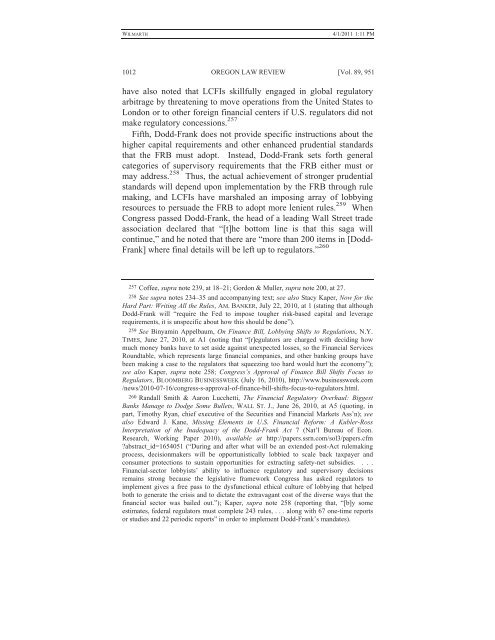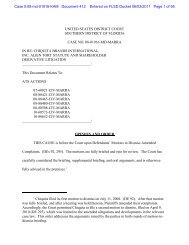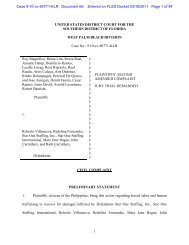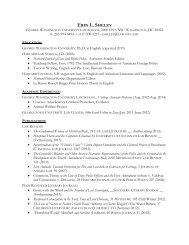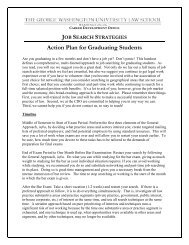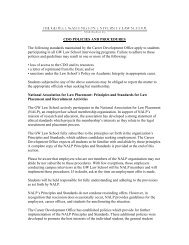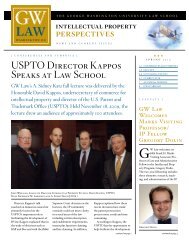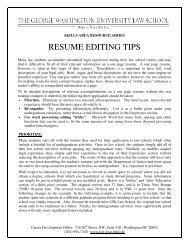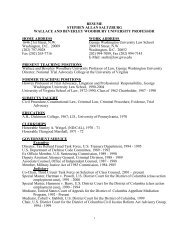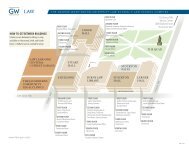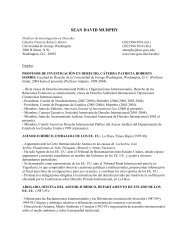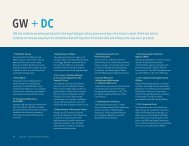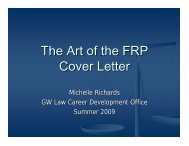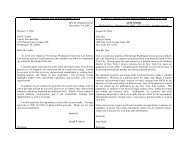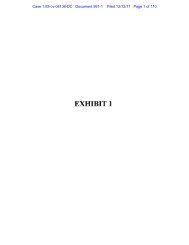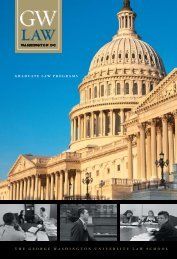CLE Materials for Panel #1 - George Washington University Law ...
CLE Materials for Panel #1 - George Washington University Law ...
CLE Materials for Panel #1 - George Washington University Law ...
You also want an ePaper? Increase the reach of your titles
YUMPU automatically turns print PDFs into web optimized ePapers that Google loves.
WILMARTH<br />
4/1/2011 1:11 PM<br />
1012 OREGON LAW REVIEW [Vol. 89, 951<br />
have also noted that LCFIs skillfully engaged in global regulatory<br />
arbitrage by threatening to move operations from the United States to<br />
London or to other <strong>for</strong>eign financial centers if U.S. regulators did not<br />
make regulatory concessions. 257<br />
Fifth, Dodd-Frank does not provide specific instructions about the<br />
higher capital requirements and other enhanced prudential standards<br />
that the FRB must adopt. Instead, Dodd-Frank sets <strong>for</strong>th general<br />
categories of supervisory requirements that the FRB either must or<br />
may address. 258 Thus, the actual achievement of stronger prudential<br />
standards will depend upon implementation by the FRB through rule<br />
making, and LCFIs have marshaled an imposing array of lobbying<br />
resources to persuade the FRB to adopt more lenient rules. 259 When<br />
Congress passed Dodd-Frank, the head of a leading Wall Street trade<br />
association declared that “[t]he bottom line is that this saga will<br />
continue,” and he noted that there are “more than 200 items in [Dodd-<br />
Frank] where final details will be left up to regulators.” 260<br />
257 Coffee, supra note 239, at 18–21; Gordon & Muller, supra note 200, at 27.<br />
258 See supra notes 234–35 and accompanying text; see also Stacy Kaper, Now <strong>for</strong> the<br />
Hard Part: Writing All the Rules, AM. BANKER, July 22, 2010, at 1 (stating that although<br />
Dodd-Frank will “require the Fed to impose tougher risk-based capital and leverage<br />
requirements, it is unspecific about how this should be done”).<br />
259 See Binyamin Appelbaum, On Finance Bill, Lobbying Shifts to Regulations, N.Y.<br />
TIMES, June 27, 2010, at A1 (noting that “[r]egulators are charged with deciding how<br />
much money banks have to set aside against unexpected losses, so the Financial Services<br />
Roundtable, which represents large financial companies, and other banking groups have<br />
been making a case to the regulators that squeezing too hard would hurt the economy”);<br />
see also Kaper, supra note 258; Congress’s Approval of Finance Bill Shifts Focus to<br />
Regulators, BLOOMBERG BUSINESSWEEK (July 16, 2010), http://www.businessweek.com<br />
/news/2010-07-16/congress-s-approval-of-finance-bill-shifts-focus-to-regulators.html.<br />
260 Randall Smith & Aaron Lucchetti, The Financial Regulatory Overhaul: Biggest<br />
Banks Manage to Dodge Some Bullets, WALL ST. J., June 26, 2010, at A5 (quoting, in<br />
part, Timothy Ryan, chief executive of the Securities and Financial Markets Ass’n); see<br />
also Edward J. Kane, Missing Elements in U.S. Financial Re<strong>for</strong>m: A Kubler-Ross<br />
Interpretation of the Inadequacy of the Dodd-Frank Act 7 (Nat’l Bureau of Econ.<br />
Research, Working Paper 2010), available at http://papers.ssrn.com/sol3/papers.cfm<br />
?abstract_id=1654051 (“During and after what will be an extended post-Act rulemaking<br />
process, decisionmakers will be opportunistically lobbied to scale back taxpayer and<br />
consumer protections to sustain opportunities <strong>for</strong> extracting safety-net subsidies. . . .<br />
Financial-sector lobbyists’ ability to influence regulatory and supervisory decisions<br />
remains strong because the legislative framework Congress has asked regulators to<br />
implement gives a free pass to the dysfunctional ethical culture of lobbying that helped<br />
both to generate the crisis and to dictate the extravagant cost of the diverse ways that the<br />
financial sector was bailed out.”); Kaper, supra note 258 (reporting that, “[b]y some<br />
estimates, federal regulators must complete 243 rules, . . . along with 67 one-time reports<br />
or studies and 22 periodic reports” in order to implement Dodd-Frank’s mandates).


